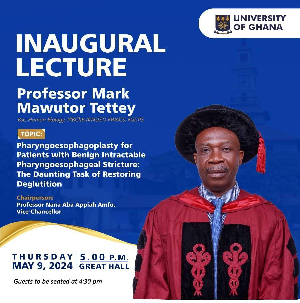The University of Ghana witnessed a momentous occasion as Professor Mark Mawutor Tettey, from the Department of Surgery (UGMS), delivered the first Inaugural Lecture for the 2023/2024 academic year.
The lecture, held in the prestigious Great Hall, focused on a critical medical issue: “The Scourge of Caustic Burns to the Throat: Challenges of Restoring a Normal Swallowing Mechanism.”
Understanding Swallowing Mechanism
Swallowing, or deglutition, is a complex bodily function that we often take for granted—until it becomes challenging or impossible. The process involves coordinated movements of various structures, ensuring that food travels from the mouth to the stomach without aspiration. At the pharyngeal level, the anatomy becomes intricate. The pharynx, a muscular tunnel connecting the mouth and nose to the esophagus and larynx, plays a crucial role.
The Threat of Caustic Burns
Caustic injuries to the aerodigestive tract occur when individuals accidentally or intentionally ingest strong acids or alkalis. In our environment, accidental ingestion of caustic soda is alarmingly common and poses a serious public health issue. Caustic soda, a potent alkali, wreaks havoc on tissues, leaving behind chemical burns with necrosis that can penetrate deep into organs.
Tragically, victims are often children of mothers who engage in local soap making. The caustic soda, a key ingredient in soap production, is stored in familiar containers (such as cups or water bottles), leading to unsuspecting ingestion by thirsty children.
Devastating Consequences
Patients who swallow caustic substances suffer damage to structures in the oral cavity, pharynx, larynx, and oesophagus. Long-term complications include fibrosis and stricture formation, which distort the normal anatomy. Strictures can obliterate the lumen, impair coordination, and result in lifelong dysphagia (difficulty swallowing). In severe cases, the airway itself is threatened.
Prof. Tettey’s Research and Insights
Professor Mark Tettey’s lecture shed light on the challenges faced by both patients and medical practitioners dealing with benign pharyngoesophageal strictures caused by caustic burns. His expertise in this field has significant implications for restoring normal swallowing mechanisms and improving patients’ quality of life.
The University community, along with invited guests, gathered in the Great Hall to listen to Prof. Tettey’s enlightening discourse. The lecture emphasized the importance of awareness, prevention, and effective management of caustic injuries. As we reflect on this inaugural event, we recognize the vital role that research and education play in addressing pressing health issues.
All are cordially invited to engage in further dialogue and exploration of this critical topic. Prof. Nana Aba Appiah Amfo, Vice-Chancellor of the University of Ghana, chaired the event, underscoring the institution’s commitment to advancing knowledge and fostering positive change.
In a heartwarming moment, Professor Mark Mawutor Tettey’s 1982 high schoolmates took the stage during the inaugural lecture at the University of Ghana. With genuine smiles and a sense of nostalgia, they presented him with a well-deserved citation. Their presence not only honoured their shared past but also celebrated Prof. Tettey’s remarkable journey from those formative years to becoming a distinguished academic in the field of surgery.
Let us collectively work towards a safer and healthier future, where caustic burns no longer threaten our well-being.
Press Releases of Saturday, 11 May 2024
Source: ugms and sankofaonline.com
Inaugural Lecture by Prof. Mark Tettey at University of Ghana
Entertainment












